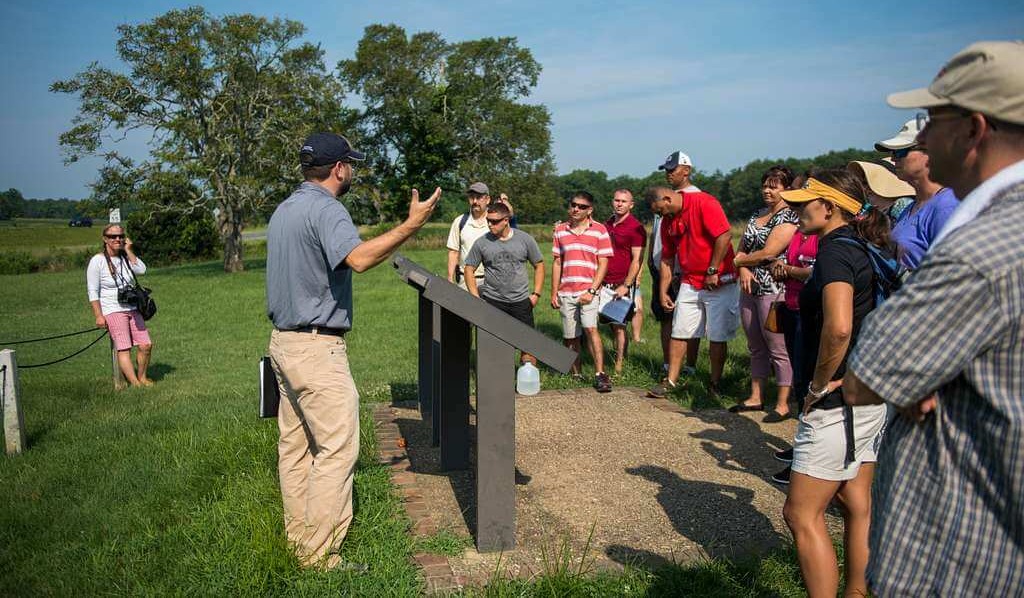Table of Contents
Introduction
Have you ever dreamt of turning your love for your local area into an exciting and fulfilling career? Well, you’re in the right place! In this guide, we’re going to explore how to become a tour guide in 12 super easy steps.
Being a tour guide is not just a job; it’s a chance to share your passion for your community, its history, and its culture with people from all over the world. Whether you’re a history buff, a storyteller at heart, or simply someone who loves connecting with others, this profession offers an incredible opportunity to do what you love while getting paid for it.
But here’s the best part: To get started, you don’t need a fancy degree or years of expertise. Our step-by-step approach will take you from a local enthusiast to a confident tour guide. So, let’s embark on this exciting journey together and discover how you can effortlessly become a tour guide in just a dozen simple steps!
Step 1: Discovering Your Passion to Become a Tour Guide
A. Understanding the Importance of Genuine Interest
Before you dive into the world of tour guiding, it’s crucial to ask yourself: “Do I have a true passion for this role?” Becoming a tour guide isn’t just about reciting facts; it’s about sharing your enthusiasm and knowledge with others. When you’re genuinely passionate about what you’re presenting, it shines through in your interactions with your guests.
Your enthusiasm will not only keep your audience engaged but also make your journey as a tour guide incredibly rewarding. Think about the places, stories, or aspects of your community that truly excite you. It could be the rich history, the vibrant culture, or the stunning natural landscapes. Your passion will be contagious, making the tour experience memorable for your guests.


B. Tips for Self-Assessment and Identifying Your Passion
- Reflect on your interest: What aspects of your local area or community captivate you the most? Make a list and prioritize them.
- Try different tours: Participate in various tours as a guest to see which once resonate with you the most. Pay attention to the guides who inspire you.
- Explore your hobbies: Consider how your hobbies and interests align with tour guiding. For example, if you love art, you might excel at guiding art tours.
By taking the time to identify and nurture your passion for guiding, you’ll set a solid foundation for your journey to become a tour guide that both you and your future guests will cherish.
Step 2: Research Your Local Area
A. Why Local Knowledge is Crucial
As you embark on your journey to become a tour guide, understanding the significance of local knowledge is your first step towards success. Local knowledge is the backbone of tour guiding; it’s what sets you apart as an authentic guide. When you intimately know your area, you can weave captivating stories and provide valuable insights that visitors won’t find in guidebooks.
Imagine taking a tour with a guide who can’t answer basic questions about the area or lacks enthusiasm for its history and culture. It’s a disappointing experience, to put it mildly. Local knowledge not only builds your credibility but also enhances the overall tour experience, leaving your guests with lasting memories.
B. Resources and Methods for Researching Your Area
- Library and Archives: Explore local libraries and archives to uncover historical documents, photographs, and maps.
- Museums and Historical Societies: Visit museums and connect with historical societies to gather information and artifacts.
- Local Experts: Seek guidance from local historians, archaeologists, or long-time residents who can offer invaluable insights.
- Online Resources: Utilize online resources, including websites, forums, and digital archives, to access a wealth of information.
Step 3: Learn the Art of Storytelling
A. Emphasizing the Role of Storytelling in Tour Guiding
As you progress in your journey to become a tour guide, you’ll quickly realize that storytelling is at the heart of this captivating profession. Effective storytelling breathes life into historical facts and cultural insights, transforming them into memorable experiences for your guests. It’s the magic ingredient that keeps them engaged, enthralled, and eager to learn more.
Imagine sharing a dry list of historical events versus painting a vivid picture of the past with relatable characters, emotions, and context. The latter not only educates but also resonates with your audience on a deeper level. Stories make history and culture come alive, leaving a lasting impact on those you guide.


B. Recommendations for Improving Storytelling Skills
- Read Widely: Explore books on storytelling, historical fiction, and local legends to expand your storytelling repertoire.
- Take Courses: Enrol in storytelling courses, drama classes, or even public speaking workshops to refine your skills.
- Practice and Feedback: Practice telling stories to friends and family, seeking constructive feedback to improve.
- Observe Seasoned Guides: Attend tours led by experienced guides to observe their storytelling techniques.
Step 4: Understand the Basics of Role of Storytelling in Tour Guiding
A. Stressing the Importance of Historical and Cultural Knowledge
To become a tour guide, you must embrace the rich tapestry of history and culture in your local area. Why? Because this knowledge is the bedrock upon which your tours will stand. Understanding the historical events, traditions, and customs unique to your region enables you to provide insightful, immersive experiences for your guests.
Imagine leading a tour through a historic district without knowing the stories behind the buildings or the cultural significance of the architecture. It resembles a puzzle with unfinished components. Historical and cultural knowledge not only enriches your narratives but also fosters a deeper connection between your guests and the places you guide them through.


B. Suggestions for Learning About Your Area’s History and Culture
- Local Museums and Cultural Centers: Explore your area’s museums, cultural centres, and heritage sites for in-depth insights.
- Books and Documentaries: Read books, watch documentaries, and listen to podcasts that delve into your region’s history and culture.
- Interview Local Experts: Seek out local historians, artists, and cultural experts for interviews and discussions.
- Join Historical Societies: Become a member of historical societies or local organizations dedicated to preserving your area’s heritage.
Step 5: Develop Public Speaking Skills
A. Understanding the Vital Role of Effective Communication
As you embark on your journey to become a tour guide, recognize that being a stellar communicator is non-negotiable. Tour guiding is more than just sharing facts; it’s about captivating your audience and making the experience memorable. Effective communication not only conveys information but also engages, entertains, and inspires your guests.
Imagine guiding a group of visitors through a bustling market or historic site without the ability to convey your passion and knowledge clearly. It would be like watching a silent movie – lacking the depth and connection that words provide. Mastering public speaking is your key to connecting with your audience, keeping their attention, and ensuring they leave with a profound understanding of your subject.


B. Tips and Exercises for Enhancing Public Speaking Abilities
- Practice in Front of a Mirror: Practice your tour narratives in front of a mirror to observe your gestures, facial expressions, and body language.
- Record Yourself: Record your practice sessions and evaluate them to identify areas for improvement.
- Join a Toastmasters Club: Consider joining a local Toastmasters club to refine your public speaking skills in a supportive environment.
- Breathing and Relaxation Techniques: Learn deep breathing and relaxation exercises to calm nerves and project confidence.
Step 6: Get the Necessary Certifications
A. Certifications and Licenses: A Vital Step in Your Journey to Become a Tour Guide
In your pursuit to become a tour guide, acquiring the right certifications and licenses is a pivotal step. These credentials not only ensure your credibility but also demonstrate your commitment to professionalism and safety. However, the specific requirements can vary significantly depending on your region or the type of tours you intend to conduct.
Begin by researching the certifications needed in your area. These might include tour guide licenses, first aid training, or specific permits for guiding in certain locations. To stay current and reliable, regularly check local regulations as they can change.


B. Navigating the Application Process
Once you’ve identified the necessary certifications to become a tour guide, the next step is understanding the application process. Contact local authorities or governing bodies for detailed information on how to apply, required documents, fees, and any exams or interviews you may need to pass.
Step 7: Create Unique Tour Itineraries
A. The Significance of Unique and Engaging Itineraries
To truly become a tour guide who stands out, you must recognize the paramount importance of crafting unique and engaging tour itineraries. Your itineraries are the blueprints for memorable experiences, setting the stage for your guests to explore, learn, and be captivated by your chosen destinations.
Consider this: travelers often seek immersive experiences that go beyond the typical tourist attractions. Crafting distinctive itineraries tailored to your expertise and your area’s hidden gems can set you apart in a competitive market. Unique tours not only attract more visitors but also leave them with lasting impressions and positive reviews.


B. Advice on Crafting Appealing Tour Routes
- Research and Exploration: Continuously explore your area to uncover hidden gems and lesser-known stories.
- Personalization: Tailor itineraries to your guests’ interests, ensuring a personalized experience.
- Balance: Mix popular attractions with off-the-beaten-path spots to provide a well-rounded adventure.
- Storytelling: Weave compelling narratives into your itineraries, connecting each stop to a larger story.
Step 8: Network and Build Connections
A. The Crucial Role of Networking in the Tour Guide Industry
In your quest to become a tour guide, networking isn’t just an option; it’s a strategic necessity. The tour guide industry thrives on relationships and connections. Networking opens doors to collaborations, referrals, and valuable insights that can elevate your career.
Consider this: by building a strong network, you can tap into the expertise of fellow guides, connect with potential clients, and gain access to exclusive locations or resources. It’s your ticket to staying informed about industry trends and emerging opportunities.


B. Strategies for Connecting with Local Businesses and Organizations
- Attend Local Events: Participate in community events, workshops, and tourism-related gatherings to meet potential partners.
- Collaborate with Hotels and Travel Agencies: Establish partnerships with hotels and travel agencies to attract tourists seeking guided experiences.
- Online Presence: Leverage social media and online platforms to connect with local businesses and organizations in your area.
- Offer Workshops and Talks: Share your expertise through workshops or talks, showcasing your knowledge and building credibility.
Step 9: Invest in Quality Tour Equipment
A. Essential Equipment for Guiding
As you progress toward becoming a tour guide, investing in quality tour equipment is essential for providing a smooth and memorable experience for your guests. The following is a list of several necessities:
- Public Address (PA) System: Ensure everyone can hear your insights clearly, especially in large groups or noisy environments.
- Maps and Visual Aids: Use maps, diagrams, or multimedia presentations to enhance your storytelling and explanations.
- Comfortable Footwear: You’ll be on your feet a lot, so invest in comfortable, durable shoes or walking boots.
- Weather-Appropriate Gear: Depending on your location, items like umbrellas, sun hats, or raincoats may be necessary.
B. Budget-Friendly Options and Where to Purchase
- Although quality is crucial, there are many affordable options available:
- Second-hand Equipment: Check online marketplaces or local stores for gently used equipment.
- Wholesale Retailers: Look for discounts at wholesale retailers or during seasonal sales.
- Rentals: Consider renting equipment for occasional use, especially when starting.
- Local Suppliers: Support local businesses that specialize in tour equipment.
Step 10: Market Your Tour Services
A. Strategies for Promoting Your Tours
Now that you’re on your way to becoming a tour guide, it’s time to spread the word about your exciting tours. Effective marketing is essential for attracting guests and growing your business. Here are some strategies to consider:
- Create a Captivating Website: Build a user-friendly website that showcases your tours, highlights your expertise, and allows online booking.
- Utilize social media: Leverage platforms like Instagram, Facebook, and Twitter to share captivating content, engage with potential guests, and run targeted ads.
- Online Travel Platforms: List your tours on popular travel websites and review platforms, such as TripAdvisor or Airbnb Experiences.
- Local Marketing: Partner with local hotels, restaurants, and tourist information centres to promote your tours.


B. Online and Offline Marketing Methods
- Content Marketing: Write engaging blog posts about your area’s attractions, history, and culture to establish yourself as an expert and improve SEO.
- Networking: Attend tourism trade shows, conferences, and events to connect with other industry professionals and potential clients.
- Brochures and Flyers: Create visually appealing print materials to distribute to local businesses and visitor centres.
- Email Marketing: Build an email list and send out newsletters with tour updates, special offers, and informative content.
Step 11: Provide Outstanding Customer Service
A. The Significance of Exceptional Customer Service
On your journey to become a tour guide, remember that exceptional customer service is your secret weapon. It’s the difference between a one-time guest and a loyal advocate. By going the extra mile, you not only create memorable experiences but also foster a positive reputation, leading to more bookings and referrals.
Exceptional customer service builds trust and leaves a lasting impression. It ensures that your guests feel valued, heard, and cared for throughout their tour. Happy customers are more likely to leave glowing reviews, share their experiences with friends and family, and return for more tours.


B. Tips for Ensuring a Memorable Experience for Your Guests
- Personalized Attention: Get to know your guests and their interests to tailor the tour experience to their preferences.
- Clear Communication: Provide clear instructions, answer questions, and be responsive to guest needs.
- Safety First: Always prioritize safety, especially during outdoor or adventurous tours.
- Engage and Educate: Keep your guests engaged with stories, anecdotes, and interesting facts about the places you visit.
- Collect Feedback: Encourage feedback after the tour to continuously improve your services.
Step 12: Continuously Improve and Adapt
A. Emphasizing the Need for Ongoing Learning and Growth
Your journey to become a tour guide doesn’t end with your first tour—it’s an ongoing adventure of learning and growth. Embrace the philosophy that every tour, every guest, and every experience is an opportunity to improve. The world is ever-changing, and to stay relevant and engaging, you must commit to continuous learning.
As you strive to become a tour guide, your knowledge should evolve with the times. Stay curious, seek out new stories and perspectives, and deepen your understanding of your area’s history and culture. Attend workshops, conferences, and courses that enhance your skills, whether in storytelling, language proficiency, or technology.
B. Ways to Stay Updated and Adapt to Changing Circumstances
- Stay Informed: Regularly read books, articles, and watch documentaries about your area and related topics.
- Guest Feedback: Listen to your guests’ feedback and use it to refine your tours and services.
- Adapt to Technology: Embrace technology for virtual tours, GPS-guided walks, or interactive apps to enhance the tour experience.
- Networking: Connect with fellow guides to share insights and stay abreast of industry trends.
Conclusion
Congratulations on exploring the path to become a tour guide! Now that you have a roadmap, take that first step toward your guiding dream. Embrace your passion, gather knowledge, and never stop learning. Share your love for your area, and you’ll not only become a tour guide but also create unforgettable experiences for others. Your journey begins today—seize the opportunity to turn your passion into a rewarding career, one step at a time.
Frequently Asked Questions (FAQs)
FAQ 1: What qualifications do I need to become a tour guide?
To become a tour guide, qualifications can vary by location, but generally, you’ll need local certifications or licenses. First aid training and knowledge of your area’s history and culture are also essential.
FAQ 2: Can I become a tour guide without prior experience?
Yes, you can! Many successful tour guides start with a passion for their local area and learn as they go. However, gaining experience through internships or working with experienced guides can be beneficial.
FAQ 3: How do I market my tour services effectively?
Marketing your tour services involves creating a website, utilizing social media, and partnering with local businesses. You can also list your tours on popular travel platforms to reach a wider audience.
FAQ 4: Is storytelling really that important for tour guiding?
Absolutely! Storytelling is the heart of tour guiding. It engages your guests and makes the information memorable. Learning the art of storytelling is crucial to become a tour guide who captivates and educates.
FAQ 5: How can I keep up with changing circumstances and industry trends as a tour guide?
Staying informed is key. Attending workshops, networking with other guides, and adapting to technology. Continuously improving your knowledge and offerings will ensure your success as a tour guide.

